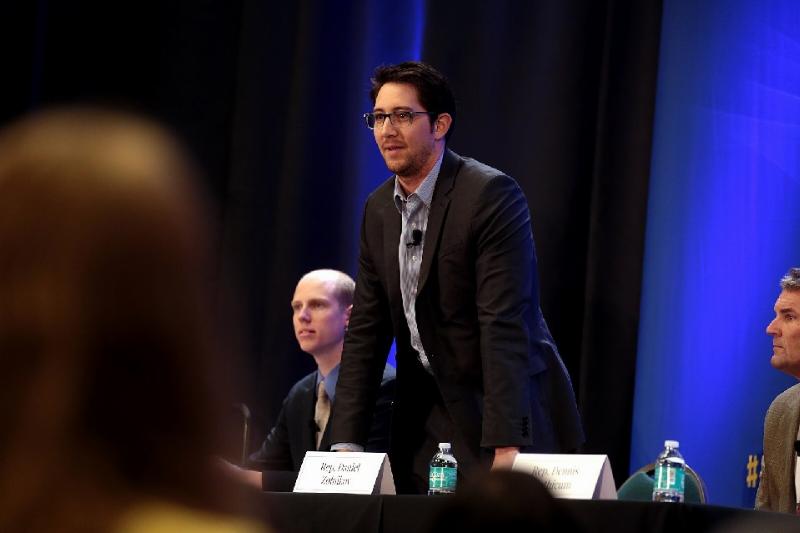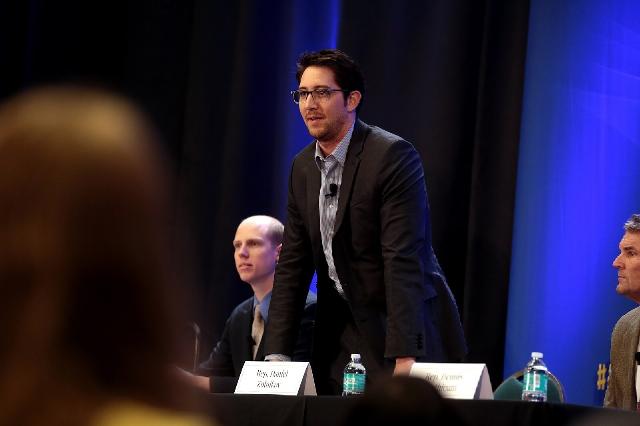


When people from around the world think about Montana, they think about the state’s natural beauty, outdoor recreation, and rugged people living on the outskirts of American civilization. It may come as a surprise, then, that Montana is on the cutting edge of tech policy in the United States.
A thousand miles away from Silicon Valley, Montana lawmakers have striven to strike a balance between protecting residents from the risks of emerging technologies and encouraging tech innovators to set up shop in the state. Montana state senator Daniel Zolnikov, a 38-year-old Republican from Billings, has led the effort.
Zolnikov began working on tech privacy and freedom issues as a freshman state lawmaker in 2013 and over time established himself as a leader in the area by championing multiple such bills nearly every legislative session since. Montana’s legislature only meets for 90 days every other year, so he has to work quickly and wisely.
In 2025, Zolnikov sponsored legislation giving Montanans ownership of their neural data, prohibiting the use of Central Bank Digital Currency, codifying a right to compute, and strengthening online consumer privacy protections.
Zolnikov told me in a recent interview that his approach is rooted in applying private property rights to data. In doing so, Montana can protect the rights of residents while also safeguarding space for innovation, Zolnikov argued.
The seasoned lawmaker pointed to his legislation giving Montanans ownership over their internet data as an example of how to both protect consumers and promote innovation.
“If I own my property, I also want to pass laws that say: hey, you can innovate in a positive way, but you don’t get to innovate on my property. So, you don’t get to innovate with my data without my consent, but you get to innovate any way you want to as long as you’re not crossing my property lines,” Zolnikov said. “That’s been functional for hundreds of years, we’re just trying to do it in a technological way.”
Zolnikov noted the difficulty of crafting and passing balanced legislation, adding that it is becoming increasingly difficult as the policy area gets more complex with new technologies.
States largely left regulation of the digital sphere to the federal government, until it became clear that Washington could not (or would not) keep up with the issues that arose from rapid advancements in technology, Zolnikov said. States are now leading the charge and experimenting with their own policy innovations, but some state governments have taken an anti-tech approach, which Zolnikov warned against.
 “States are going hardcore on consumer privacy laws, AI laws, all types of laws. The benefit is you have 50 experiments, the lab of democracy. The detriment is that a lot of these new laws are anti-new-technologies from people who don’t understand them, hear the negatives, and don’t see all the benefits. So, that’s the problem we’re running into, especially with AI,” Zolnikov said.
“States are going hardcore on consumer privacy laws, AI laws, all types of laws. The benefit is you have 50 experiments, the lab of democracy. The detriment is that a lot of these new laws are anti-new-technologies from people who don’t understand them, hear the negatives, and don’t see all the benefits. So, that’s the problem we’re running into, especially with AI,” Zolnikov said.
Zolnikov was not the only Montana lawmaker looking to the future and trying to get ahead of problems linked to new technologies. Notably, the legislature passed a bill from Republican Senate president pro tempore Ken Bogner restricting the remote deactivation of devices using a kill switch.
Cutting-edge legislation like the right to compute can also help safeguard older rights amid advancements in technology. Montana’s right to compute law has been dubbed a “digital Second Amendment” and one of the biggest pro-gun victories in years because it protects activity related to 3D-printed firearm components. Many Montanans may not quite understand computational rights, but they certainly understand freedom as it relates to guns.
Montana’s geography -- its openness and emptiness -- instills a sense of freedom into residents, according to Zolnikov. The landscape doesn’t put a “false ceiling” over people’s heads, the lawmaker said, comparing it to his high-ceiling childhood home in rural Montana. It is easy to find peace and exercise freedom in Montana’s vast outdoors, so the state naturally attracts “refugees” from across the country who seek a life of liberty, Zolnikov added.
Although Montana cities don’t have the same proximity to capital or business networks as major metro areas, tech leaders could still benefit from spending time in the state.
“Here, there’s another thing that you get: the freedom to sit and think and literally remove yourself, which I think is a huge benefit that is undervalued by our society,” Zolnikov said.
Indeed, one of America’s most prominent tech and policy figures, Elon Musk, reportedly traveled to the Paws Up resort near Missoula, Montana recently. The award-winning resort describes itself as a “western wilderness experience” with dozens of activities. As Zolnikov suggested, tech leaders are turning to the mountains and woods of Montana as an escape from the concrete and glass of major metro areas. Any longtime resident of Bozeman, Missoula, or Kalispell could vouch for the influx of remote workers and rich wannabe-ranchers who flocked to Montana during the pandemic or after watching Yellowstone.
Montana’s geography is not only attractive to people, but also to data centers -- an increasingly significant industry. According to a 2024 report from the Montana-based Frontier Institute think tank, Montana is a “world-class” destination for computing due to its cool, dry climate, low risk of natural disaster, and existing fiber optic infrastructure in the state. Montana’s business-friendly policies, abundant land, and proximity to energy resources are also attractive to data center developers.
Recognizing the right to compute is a major step toward positioning Montana as a hub for data centers, the report contended. The demand for such locations is only set to increase as the amount of data and computation increases drastically with the widespread adoption of AI technology.
Montana’s past was tied to the frontier, and so too is its future. The small population, flexible politics, and solution-oriented mindset of Montana lets it be more dynamic than many other states, as is evident in its leadership on tech policy. When there are problems, Montanans are keen to roll up their sleeves and solve them instead of waiting for others to put in the work.
“You started to see this technology encroach in our lives, taking our data here, and invading something there, and affecting people’s minds in different ways. So you start to say: okay, I love innovation but people need to be in charge of this and have to have a say, or else we’re going to be encroached on not like with neighbors, but with technology companies having a huge say in our lives. It’s a different type of way of impeding our freedom,” Zolnikov said.
Former Montana resident and infamous anti-tech radical Ted Kaczynski took a criminal approach to the problem and accomplished very little. Instead of hiding away in a cabin writing a manifesto, Zolnikov is in the halls of the state capitol writing bills, accomplishing much more.
Other state and federal policymakers can look to Montana as a model on the frontier of tech-related issues. If other states fail to act, at least Americans can find both freedom from tech tyranny and freedom to innovate with tech in Montana -- a state in the mountains as a city on a hill.
Ethan Charles Holmes is a former newswire writer with degrees in Russian and Political Science from the University of Montana. He writes regularly on issues related to foreign policy, culture, philosophy, and tech. You can follow his work on X here.
Image: Gage Skidmore
